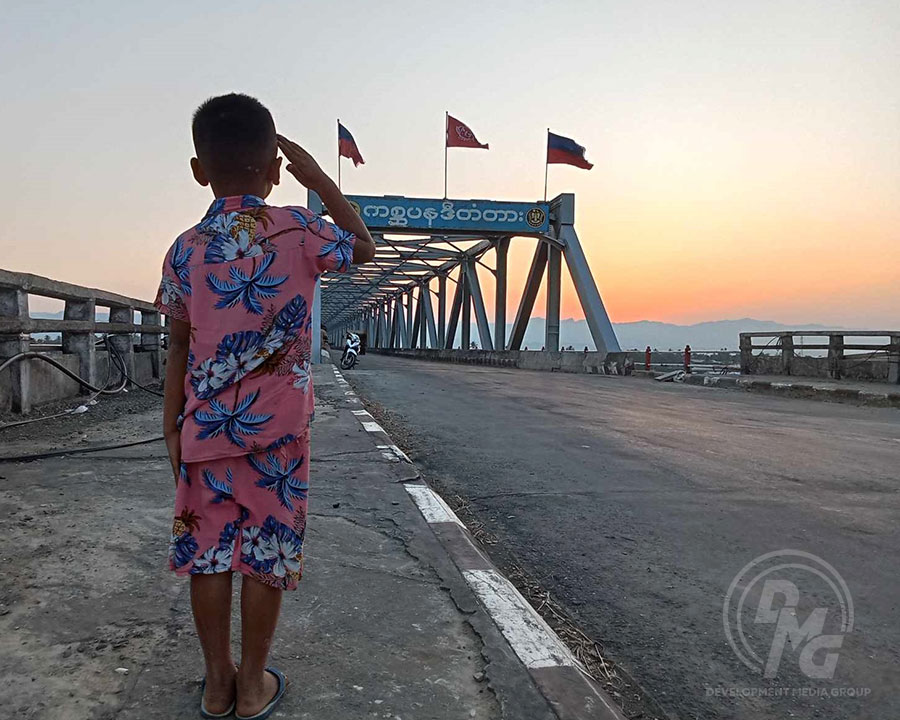- People with disabilities in Arakan State face severe livelihood hardships amid ongoing conflict
- Junta launches major offensive to retake strategic Mawchi mining town
- Extreme poverty drives Sittwe residents to dismantle abandoned houses for income
- Weekly Highlights from Arakan (Feb 23 to March 1, 2026)
- Over 300 political prisoners freed from 10 prisons nationwide
Defending the Arakan Dream
In the building of a new Arakan State, there is a need for both fighters and civilians who share a common cause; the demand for human resources skilled in the fields of business, education and healthcare is no less important than finding more people within Myanmar and abroad who are willing to take up arms.
02 Nov 2024

Written by Gaung
Since early this year, the "Arakan Dream" has seemed no longer to be a mere pipe dream, but rather is becoming a reality. The goal of "sovereignty," which the Arakanese people have aspired to for more than 240 years, is finally taking shape.
The military regime's administrative mechanism has collapsed across most of Arakan State, with only some junta offices still operating in Sittwe, Ann, Kyaukphyu, Manaung, Taungup and Gwa towns. Arakkha State flags fly at most other government offices while Arakkha military flags wave at many outposts formerly held by the Myanmar military.
The Arakkha Army (AA) asked the people to endure "the storm of revolution" in 2018-19 as it launched a revolt in Arakan State. It declared the "Arakan Dream" and "The Way of Rakhita" in 2020, and has since proven itself with deeds. Previously known as the Arakan Army, it adopted the new name, the Arakkha Army, earlier this year to represent the entirety of Arakan State.
Challenges Await
Many tough challenges await the AA as it seeks to build a new Arakan State. This article intends to highlight the hurdles facing the AA in the defence sector.
As a de facto independent governing jurisdiction, the envisioned Arakan State of the future would need considerable and considered defence forces, given its geographical position.
The junta has been forced to withdraw from many parts of Arakan State, but it still has its Navy and Air Force, which it can use to launch counter-offensive measures. What's more, the regime has been enforcing mandatory military service to replenish its depleted ranks.
In short, a future Arakan State will need both human capital and modern weaponry to defend its territorial integrity.
Arakan State is bounded by the Yoma mountain range, the Chin Hills and the sea. It is bordered by Ayeyarwady, Bago and Magwe regions to the east, Chin State and India to the north, and Bangladesh to the west. The Arakkha People's Government needs to expand its armed forces for the safety of each and every person within its territory.
AA chief Major-General Twan Mrat Naing has said the AA boasts more than 40,000 combat troops, excluding auxiliary forces. They are understood to be fighting alongside anti-junta allies across Myanmar. But there have no doubt been casualties - soldiers killed or injured in action - since the latest hostilities with the regime in Arakan State broke out nearly one year ago.
After seizing the majority of Arakan State's 17 townships, it is time that the AA takes action to retain them. As its controlled territory expands, the AA must reinforce its army to protect those places. Whatever its military requirements may be in the ongoing war with the Myanmar regime inside Arakan State, it will need thousands of troops to keep guard along the borders with Bangladesh and India, and at Arakan State's borders with Ayeyarwady and Magwe regions, and Chin State.
Meanwhile, Muslim groups such as the Arakan Rohingya Salvation Army (ARSA), Rohingya Solidarity Organization (RSO) and Arakan Rohingya Army (ARA) pose a significant threat. They continue to kill civilians in northern Arakan State's Maungdaw District. ARSA militants fired upon a vehicle returning from shopping in Taungpyo Town in northern Maungdaw Township on October 6, killing one woman and wounding four others.
Seven ethnic Khami people from the Gandaryi displacement camp in Buthidaung Town who went to the forest to collect bamboo shoots were killed by ARSA on July 17. Five displaced people from Buthidaung Town were killed and two others were injured on July 31 when ARSA members attacked their vehicle near Kyee Kan Pyin Village. They were driving to Kyein Chaung Village in Maungdaw Township to shop.
September saw frequent clashes between AA and ARSA forces along the AA-controlled Bangladesh-Myanmar border in northern Maungdaw Township as ARSA attacked AA outposts. Members of the Muslim militant are reportedly disguising themselves as civilians and are active along the border, prompting locals to exercise vigilance.
It is fair to say that collectively, there are thousands of armed members of ARSA, RSO and ARA, operating along a 180-plus Myanmar-Bangladesh border that is monitored ineffectually, with illegal crossings occurring in both directions on a daily basis.
These Muslim armed groups will likely continue to commit violence against local people in Arakan State, whether they be ethnic Arakanese, Thet, Khami, Mro, Hindu, or their own Rohingya people. The AA would therefore need to deploy many troops along the border.
The Chin National Front (CNF) and its subordinate groups operating inside Chin State must also be carefully monitored. The CNF and AA still have strained relations. The AA's good relationship with the Chin Brotherhood is a positive sign, but the AA will need troops to protect the Paletwa region, including along the Indian border. Lest we forget: In February 1998, the Arakanese revolutionary leader Khaing Razar and other Arakanese and Karen leaders were assassinated by the Indian Navy in the Indian archipelago of Andaman.
On the eastern flank, Myanmar's military regime may send reinforcements from Magwe, Bago and Ayeyarwady regions via Ann, Taungup and Gwa townships. The AA must provide security at all of the access points to Arakan State.
How to Defend the New Arakan?
This raises an important question. The people in the areas controlled by the United Wa State Army (UWSA), Ta'ang National Liberation Army (TNLA), Myanmar National Democratic Alliance Army (MNDAA) and Kachin Independence Army (KIA) are forced into civil service or conscription under the respective armed groups. This is by law or local order, and military service is mandatory for many within these groups' territory. The Myanmar regime is also recruiting military personnel using this method. This is considered hard power; a coercive action that must be done.
Internationally, soft power has also had its role to play with respect to recruitment. Ukrainians from all over the world volunteered to serve in the Ukrainian army during the Russia-Ukraine war to defend their brethren against the Russian invasion. At one point in history during the Israeli-Palestinian conflict, Israeli youth voluntarily joined the army and fought to defend the state.
Can the AA also bolster its ranks in these ways? After the AA seized the two junta command bases in Paletwa Township, Arakanese youth were invited to guard the overtaken military camps.
Look at the AA's statement issued in the second week of September. The statement said that the United League of Arakan (ULA) would expand the Department of Law Enforcement and Public Security (DLEPS) by recruiting new officers for public security and law enforcement. It is understood that this hinted at the AA's need for a stronger defence. The AA used its soft power to suggest that Arakanese youths volunteer to serve under its banner for a common aim.
It is time to consider whether Arakanese youths in Arakan State, mainland Myanmar and abroad who wish to protect Arakan State will voluntarily return to the state and serve in the AA or otherwise help in the reconstruction of the state.
In the building of a new Arakan State, there is a need for both fighters and civilians who share a common cause; the demand for human resources skilled in the fields of business, education and healthcare is no less important than finding more people within Myanmar and abroad who are willing to take up arms.
All must be urged to do their part and contribute their talents in furtherance of the Arakan Dream, which is closer now than ever before to being achieved.








.jpg)











